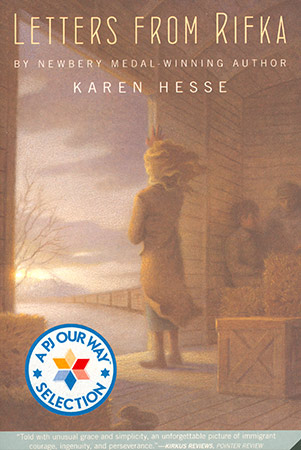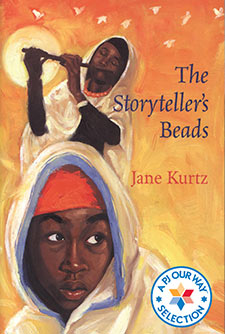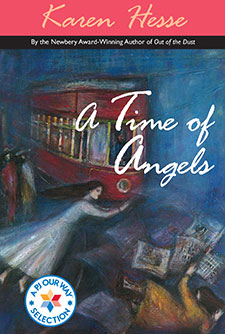Letters from Rifka
"I've got to be clever to make it out of here!" Traveling from Russia to America, twelve-year-old Rifka gets separated from her family. Will she ever find a way to join them again?
Average Rating
( hint: Login to leave a review! )
129 Reviews
Leave Review
What the Book is About
Jewish Content & Values
Positive Role Models
Content Advisory
Talk it Over!
More for You
What the Book is About
Twelve year-old Rifka is the strong Jewish heroine of this historical novel. The year is 1919 and Rifka and her family are making the arduous journey from hardship in the Ukraine to freedom in America. Rifka records her adventures in a series of letters penned to her beloved cousin, Tovah, which she writes in a volume of poetry by Pushkin. When it is discovered that Rifka has ringworm, she has to stay in Belgium while her family continues the journey without her.
Using her quick mind and her capacity for language, Rifka finally makes it to America and is reunited with her family at Ellis Island.
A multi-award winning book, Letters from Rifka inspires readers to be brave and resourceful and to never give up.
Using her quick mind and her capacity for language, Rifka finally makes it to America and is reunited with her family at Ellis Island.
A multi-award winning book, Letters from Rifka inspires readers to be brave and resourceful and to never give up.
Jewish Content & Values
- A realistic and engaging depiction of one family’s emigration from Eastern Europe to America, complete with Yiddish phrases and precious Shabbat candlesticks.
- The Hebrew Immigrant Aid Society is highlighted; this organization takes care of Rifka in Belgium while she recovers from ringworm.
- Chutzpah (Yiddish for “audacity” or “nerve”): Rifka’s outspokenness on behalf of Ilya, a Russian peasant boy, saves Ilya’s life and her own!
- Kol kvuda bat melech pnima (the beauty of the princess is within) refers to inner beauty as a Jewish value. When Rifka loses her beautiful blond curls, she realizes that her character and intelligence are far more important than superficial beauty.
Positive Role Models
- Rifka shows great courage in this story, as she travels alone to America. She is clever and resourceful and shows great kindness to others. Despite her family’s past in the Ukraine, where they hated and feared Russian peasants, she is able to forgive and love Ilya, a lonely Russian peasant boy.
- The people of Antwerp are kind to Rifka. The nuns treat her ringworm, and Marie and Gaston, the old couple she lives with, care for her. A Flemish milkman helps her return home when she gets lost.
Content Advisory
The following could be emotionally difficult:
- A Russian guard runs his hands through Rifka's hair.
- Rifka and her mother are forced to undress at the Polish border as a doctor inspects Rifka in a way that makes her uncomfortable.
- Rifka's friend Pieter dies in a storm on their way across the Atlantic Ocean.
- Rifka has a flashback about her Uncle Zeb who was shot by Russian soldiers.
Talk it Over!
- At Ellis Island, Rifka tells the authorities, “What does it matter if my hair grows? A girl cannot depend on her looks. It is better to be clever.” Do you think she is right? Is it more important to be clever or pretty? Do you think that your answer would be different had you lived in the early 1900’s?
More for You
HIAS (Hebrew Immigrant Aid Society), the very same organization that helps the fictitious Rifka, continues to provide immigrant services and refugee resettlement to those seeking asylum in America. Sergey Brin, the billionaire co-founder of Google, was helped by HIAS when he and his family fled anti-Semitism in the Soviet Union and came to the U.S. in 1979. “I would have never had the kinds of opportunities I’ve had here in the Soviet Union, or even in Russia today,” Brin said in an interview. “I would like to see anyone be able to achieve their dreams, and that’s what this organization does.”
What the Book is About
What the Book is About
Twelve year-old Rifka is the strong Jewish heroine of this historical novel. The year is 1919 and Rifka and her family are making the arduous journey from hardship in the Ukraine to freedom in America. Rifka records her adventures in a series of letters penned to her beloved cousin, Tovah, which she writes in a volume of poetry by Pushkin. When it is discovered that Rifka has ringworm, she has to stay in Belgium while her family continues the journey without her.
Using her quick mind and her capacity for language, Rifka finally makes it to America and is reunited with her family at Ellis Island.
A multi-award winning book, Letters from Rifka inspires readers to be brave and resourceful and to never give up.
Using her quick mind and her capacity for language, Rifka finally makes it to America and is reunited with her family at Ellis Island.
A multi-award winning book, Letters from Rifka inspires readers to be brave and resourceful and to never give up.
Jewish Content & Values
Jewish Content & Values
- A realistic and engaging depiction of one family’s emigration from Eastern Europe to America, complete with Yiddish phrases and precious Shabbat candlesticks.
- The Hebrew Immigrant Aid Society is highlighted; this organization takes care of Rifka in Belgium while she recovers from ringworm.
- Chutzpah (Yiddish for “audacity” or “nerve”): Rifka’s outspokenness on behalf of Ilya, a Russian peasant boy, saves Ilya’s life and her own!
- Kol kvuda bat melech pnima (the beauty of the princess is within) refers to inner beauty as a Jewish value. When Rifka loses her beautiful blond curls, she realizes that her character and intelligence are far more important than superficial beauty.
Positive Role Models
Positive Role Models
- Rifka shows great courage in this story, as she travels alone to America. She is clever and resourceful and shows great kindness to others. Despite her family’s past in the Ukraine, where they hated and feared Russian peasants, she is able to forgive and love Ilya, a lonely Russian peasant boy.
- The people of Antwerp are kind to Rifka. The nuns treat her ringworm, and Marie and Gaston, the old couple she lives with, care for her. A Flemish milkman helps her return home when she gets lost.
Content Advisory
Content Advisory
The following could be emotionally difficult:
- A Russian guard runs his hands through Rifka's hair.
- Rifka and her mother are forced to undress at the Polish border as a doctor inspects Rifka in a way that makes her uncomfortable.
- Rifka's friend Pieter dies in a storm on their way across the Atlantic Ocean.
- Rifka has a flashback about her Uncle Zeb who was shot by Russian soldiers.
Talk it Over!
Talk it Over!
- At Ellis Island, Rifka tells the authorities, “What does it matter if my hair grows? A girl cannot depend on her looks. It is better to be clever.” Do you think she is right? Is it more important to be clever or pretty? Do you think that your answer would be different had you lived in the early 1900’s?
More for You
More for You
HIAS (Hebrew Immigrant Aid Society), the very same organization that helps the fictitious Rifka, continues to provide immigrant services and refugee resettlement to those seeking asylum in America. Sergey Brin, the billionaire co-founder of Google, was helped by HIAS when he and his family fled anti-Semitism in the Soviet Union and came to the U.S. in 1979. “I would have never had the kinds of opportunities I’ve had here in the Soviet Union, or even in Russia today,” Brin said in an interview. “I would like to see anyone be able to achieve their dreams, and that’s what this organization does.”



